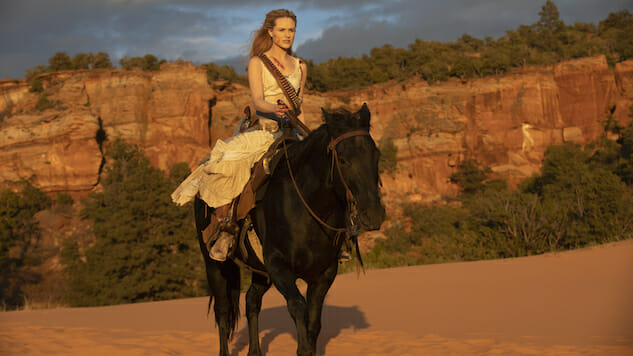Westworld Can’t Quite Stick the Landing on a Fascinating, Frustrating Season
(Episode 2.10)
Photo: John P. Johnson/HBO
Dolores (Evan Rachel Wood) was always going to be the star of Westworld’s feature-length Season Two finale, perhaps because she was one of the last characters standing that still had a goal and enough chance for failure. That’s because Maeve (Thandie Newton) is just too good at what she does. Stuff like rustling up her posse, then absolutely Mufasa-ing some jabronis with an army of stampeding cows. This is, first of all, awesome, and second of all, a great way for Maeve to reassert her destiny as the Chosen One. No saving required, boys. But, primarily, because she is so powerful (and therefore bad for drama), we get a lot of Dolores—especially as she runs into the rest of the protagonists.
There’s little I hate watching more than The Man in Black (Ed Harris) rooting around in his own arm like an anteater probing the anthill for a meal. I hate even more that the location of his injury and the bloodflow from his digging is a close reference to Juliet’s suicide. The difference is a level of feeling. The (flawed) trope of a bathtub suicide is supposed to imply that it’s easier, while nothing seems easy about fruitlessly hunting for cables in your arm – all sitting in the sun-baked grit of a fake West. That’s just a good way to get infected. And Dolores, riding up on him, isn’t here to make his life easier.
“The Passenger” calls attention to the pair’s similarities until they meet Bernard (Jeffrey Wright), when they’re further bonded by using him as a foil. As it turns out, Dolores is a creator of an artificial representation, a developer of the kind of immortality William once commissioned. That means the caring Bernard is two levels down, AI-wise, and William is staring an abomination in the face. Good thing Dolores insured William would destroy himself thanks to her handy-dandy Russian Roulette device.
Dolores speaks like a Goddess of Death, and like all deities of destruction is a reflection of mankind’s own obsession with limits. She has her self-loathing reflections (William) and her bumbling vassals (Teddy, et al.), and her own irony-drenched plots to unmake everything.
The culmination of this plot finally gives some purpose for the back-and-forth timelines of Bernard’s buggy memory. It allows us to have both action and immediate reaction (or vice-versa, in some of the episode’s more interesting narrative moments) to what goes down in The Forge, intercut without wasting time between. The Forge is an eerie wet cloning center cast in an early aughts red that offers a VR experience to a couple bots. James Delos is the test subject in this level of Incept-worlds, which leads to some truly weird stuff mixing dreams, memories, and programmable events. These are curated by the system itself, represented by Ben Barnes, who takes Bernard and Dolores on an It’s a Wonderful Life-style trip through Delos’ Matrix.
And you bet your ass it’s a Matrix. They’re programming former guests in 10,000 lines of code. Sidebar: “lines of code” is effectively meaningless. Nobody measures or values their work in lines of code. But just for example, a simple iPhone word game app has about 10,000 lines of code. A pacemaker has 80,000 lines of code. Aside from some of this silliness, the visual representation of a human database as a library filled with stories is completely in line with a narrative-obsessed series like Westworld. Books are souls and anyone that can write it out is as close to God as it gets.
-

-

-

-

-

-

-

-

-

-

-

-

-

-

-

-

-

-

-

-

-

-

-

-

-

-

-

-

-

-

-

-

-

-

-

-

-

-

-

-








































